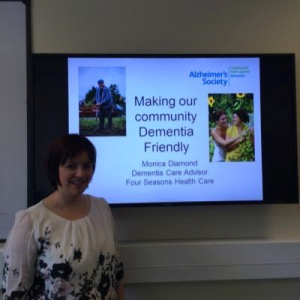Today, Saturday 10th October 2015, is World Mental Health Day. World Mental Health Day is observed on 10 October every year, with the overall objective of raising awareness of mental health issues around the world and mobilizing efforts in support of mental health. Today we are delighted to welcome our second blog on the subject from mental health nurse Monica Diamond. Monica’s blog focuses on her personal experiences in mental health nursing and the importance of dignity.
Dignity and Mental Health Nursing
I started my training as a mental health nurse in 1997 and I will always remember the first time that I set foot inside a psychiatric hospital. I entered an acute admission ward and thought I had stepped back in time. Once the cigarette smoke cleared and my eyes adjusted to the dimly lit ward my initial reaction was “Oh my god, what have I done.” There were large crowds of people all congregated in the lobby and a long corridor that had bays of people lying in them, separated only by surgical screens. Patients were all dressed in pyjamas and had no access to their money or possessions as these were tightly controlled by the hospital. Patients were often referred to using strong stigmatising and labelling language such as “attention seeker, time wasters, crazy” etc. Apathy seemed high amongst the staff, who apart from administering medication, observing for improvement or deterioration and keeping the residents free from harming themselves or other, couldn’t do much more to make the individuals better. There was strong stigma attached to mental health and this was heightened and exaggerated by the media around this time.
As time passed, the Community Care Act 1987 began to trickle into Northern Ireland. I found myself managing a supported housing unit in 2001 and felt that this was true progression. The unit was an end terrace house that had six residents who each had their own bedroom and shared communal space. The home was in close proximity to the town so that residents could independently access shops and be part of the local community. There was no sign above the door to indicate that the people living in the house were any different to individuals residing in any of the other houses along that row. The residents moved from long stay wards into the community and for the first time in a long time had their own money which empowered them to make decisions and choices about their lives.
Mental health services have improved through the years with fewer people being admitted to hospitals and shorter stay in hospital for those who require specialised treatment. The development of services in the community to enable a person to remain at home whilst providing treatment has all contributed to a better experience for individuals. The media have done their bit in positively raising awareness of mental illness and sign posting appropriate services.
Dignity is the focus for world mental health Day looking at how this can be promoted or protected for those who have mental health difficulties. Dignity, as defined by the RCN “is concerned with how people feel, think and behave in relation to the worth or value of themselves or others. To treat someone with dignity is to treat them as being of worth, in a way that is respectful of them as valued individuals”. Defending dignity has become a government, organisational and individual responsibility and has positively changed the experience of patients in mental health settings… Radical change has been underpinned by legislation and local policy in promoting dignity within the mental health services. Areas that before have threated Dignity are now governed by Safeguarding legislation, Discrimination acts and Human rights legislation.
I have seen a lot of changes in mental health services over the years.
Fundamental change has evolved from putting people at the centre of their care by the implementation of person centred care through the use of recovery models of practice. For a person to feel valued and respected they need to be in control of their own lives and Until we walk in someone else shoes we, as practitioners in the field, are only second guessing what that experience is like.
Individuals must be at the centre of their care and supported to develop knowledge and skills to help them make decisions and choices about their lives. They must also be involved and consulted in how these services are shaped and delivered. Whilst it is important to consider how dignity is maintained or protected in mental health, it is only one cog in a bigger wheel. It is equally as important to treat everyone with kindness and respect, whether you think a person can communicate or not, and to never under estimate the power of the mind. To remember the importance of love, compassion and empathy as we support individuals through difficult times. We need to understand and manage one’s self by recognising the values and beliefs that define us a person and accept unconditionally and without judgement the values and beliefs of others. This will help us to consider what is important to another and will truly ensure that the care and support offered will be tailored to individual needs.
Monica Diamond, Four Seasons Health Care.

